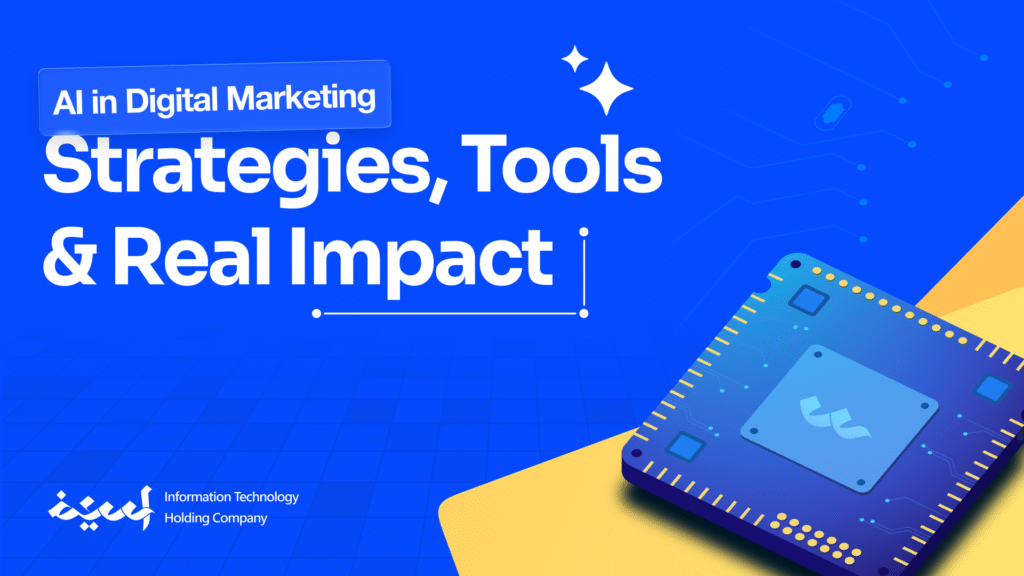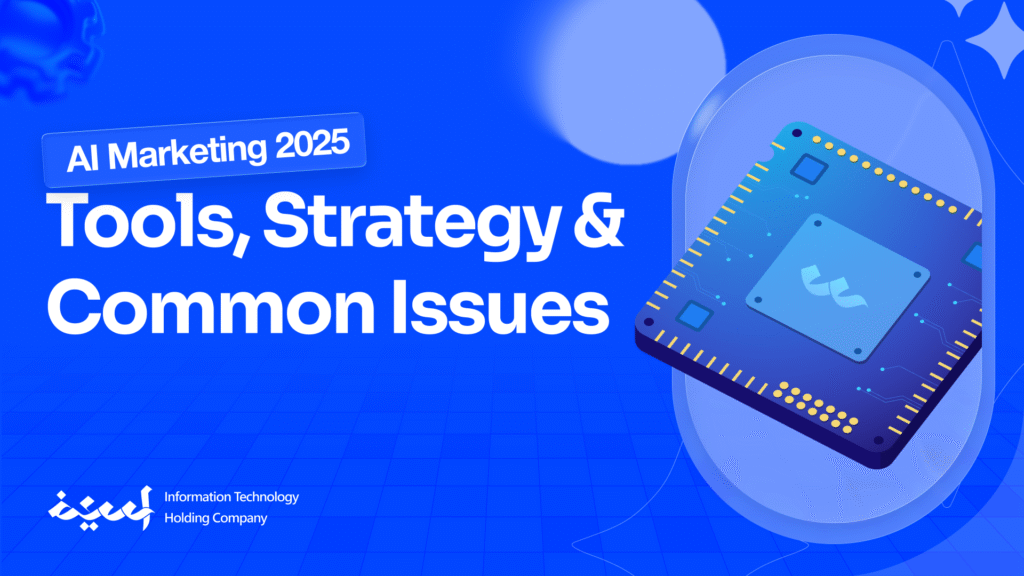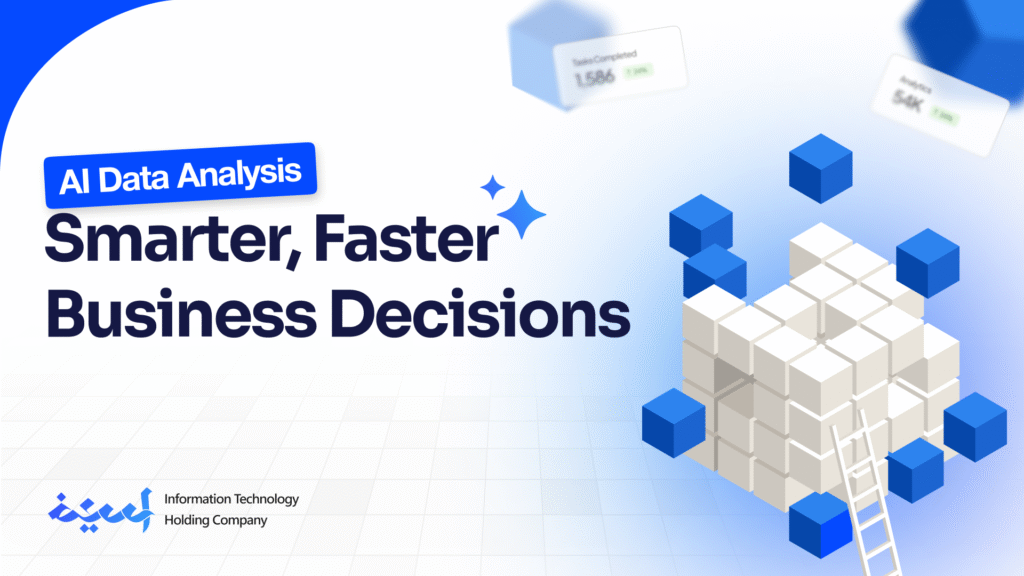- ARTICLE
AI Data Analysis: Smarter, Faster Business Decisions
Explore how AI data analysis helps businesses turn complex data into faster, smarter decisions with real impact.
Explore how AI data analysis helps businesses turn complex data into faster, smarter decisions with real impact.
Introduction
Every day, companies collect huge amounts of data—from websites, apps, customer feedback, and internal systems. But turning this information into smart business moves is not always easy. That’s why AI data analysis has become such a powerful tool. It helps organizations quickly understand what’s happening, what’s likely to happen next, and what to do about it.
At Aseef, we help businesses across sectors like healthcare, education, and finance use AI data analysis to improve how they work with data. From creating faster reports to predicting trends, our team builds custom solutions that save time and lead to better decisions.

What Is AI Data Analysis?
Exploring the Power of AI in Data Analysis
AI data analysis refers to the use of artificial intelligence technologies such as machine learning (ML), natural language processing (NLP), and generative AI to process large volumes of data, identify patterns, and produce meaningful insights.
- Machine learning is a type of AI that powers predictive modeling in AI data analysis.
- NLP contributes to AI data analysis by interpreting unstructured text like reviews or emails.
- Generative AI can automatically create summaries, recommendations, or visual reports.
Unlike traditional data methods, AI systems can learn from data over time, enabling faster and more accurate decision-making with minimal manual effort. By replacing repetitive human work with intelligent automation, AI for data analysis helps organizations turn raw data into clear and useful decisions.

How Can AI Be Used with Data Analysis?
Making data analysis faster, smarter, and more accurate with AI.
AI for data analysis enhances the entire data lifecycle from collection and preparation to interpretation and reporting. By integrating AI tools for data analysis into data systems, businesses can move beyond reactive reporting to proactive, insight-driven decision-making.
At Aseef, we use advanced AI technologies like Microsoft Azure Machine Learning ,Google Cloud AI, and AWS SageMaker to build intelligent, scalable data solutions.
These tools allow us to automate tasks such as:
Data cleansing:
To remove duplicates, errors, or irrelevant values.
Pattern recognition:
To detect trends or anomalies that might be missed by human analysts.
Natural Language Processing (NLP):
To extract insights from unstructured sources like customer reviews, emails, or RFPs.
Predictive modelling:
To forecast future outcomes and risks.
Generative AI:
To automatically create summaries, reports, or visual dashboards.
“According to Aseef, adding AI into a business’s data pipeline makes it easier to turn raw information into ready-to-use insights. Whether you’re working with databases or live data streams, AI-powered analysis adapts to your setup and delivers quick, accurate, and clear results.”

What Are the Benefits of Using AI for Data Analysis?
Key Advantages of AI-Powered Data Analysis for Modern Businesses
AI in data analysis brings major improvements to how organizations handle, interpret, and act on information. It helps teams save time, reduce errors, and make confident, data-driven decisions.
By automating time-consuming tasks, AI speeds up analysis and delivers insights faster than traditional methods. With RPA development, businesses can further optimize repetitive workflows like reporting and reconciliation—freeing up teams to focus on strategy.
Speed
AI processes large volumes of data in minutes, helping teams respond faster to business needs and reduce delays in decision-making.
Accuracy
It minimizes human error by following consistent rules, improving the reliability of insights and boosting confidence in the results.
Forecasting
AI identifies patterns in past data to predict future trends, helping businesses make smarter plans and reduce the risk of surprises.
Automation
By handling repetitive tasks like sorting and reporting, AI saves time and lets teams focus on higher-value work.
Focus
With AI managing the routine, teams can concentrate on strategy and critical decisions, avoiding data overload and distractions.
These benefits make AI-based data analysis a practical and powerful tool for any organization that wants to work smarter with data. When set up correctly, it doesn’t just save time it also helps teams move with clarity, confidence, and speed.
While AI delivers speed and automation, it requires clean, well-structured data to be effective. Poor-quality inputs or biased datasets can lead to flawed results. That’s why a structured approach is critical.
According to LUZMO, AI can feel daunting if you’re not familiar with it. But if you consider the benefits, it’s more than worth dipping your toes into it.
How Aseef Helps Businesses with AI Data Analysis
Transforming Industries with AI Data Analysis for Smarter Decisions and Growth.
Aseef’s approach to AI data analysis is industry-specific and impact-driven. We help companies unlock the power of their data with AI-driven analysis that boosts performance and predicts future trends. Here’s how:
Healthcare
We support healthcare providers in analyzing patient records to find risk patterns and improve scheduling. In one project, our AI dashboards helped reduce wait times by identifying service delays, leading to smoother operations and better patient care.
Education
Aseef works with schools and colleges to track student progress. By analyzing test scores, attendance, and engagement data, we help educators spot students who need extra support early improving student results and retention.
Logistics
We help logistics companies use AI to forecast demand, plan delivery routes, and manage inventory. One client was able to cut delivery delays and lower fuel costs by using our AI models to adjust shipments based on real-time data.
E-commerce
Aseef helps retailers understand customer buying habits, personalize product recommendations, and manage stock better. In one case, we helped a brand optimize their promotions, increasing customer loyalty and boosting sales.
Business Operations
We assist finance teams by automating reporting, detecting unusual transactions, and forecasting revenue. One company reduced their manual reconciliation time significantly through our AI solutions allowing their teams to focus on strategy and planning.
According to Aseef, the best AI for data analysis is not just about technology, but about embedding solutions that align with business goals, industry needs, and decision-making workflows.
Who Benefits from AI in Data Analysis?
Driving Efficiency and Better Decisions Across Business Functions
AI-powered insights support diverse roles across organizations, not just data scientists. Each department can use AI in data analysis differently, depending on their goals and challenges:
Executives
Business leaders rely on AI-driven dashboards to track performance, forecast trends, and make quick, data-backed decisions. Instead of waiting on reports, they get real-time views of KPIs and business health.
Data Analysts
AI speeds up tasks like data cleaning, pattern detection, and report generation. Analysts use AI tools to dive deeper into data, build models, and deliver more accurate insights faster.
Marketing Teams
Marketers use AI to segment audiences, personalize campaigns, and measure performance. Predictive models help them understand customer behaviour and improve ROI. Learn more about how AI is transforming marketing strategies in our AI in Digital Marketing guide.
Service Teams
From logistics to healthcare, operations teams use AI to monitor workflows, detect issues early, and optimize processes—like reducing delays or managing inventory in real-time.
IT Team
AI tools help automate monitoring, detect anomalies in system performance, and manage large-scale data infrastructure. These teams also maintain the pipelines and APIs that support AI models.
What is the Future of AI Data Analysis?
Key Trends Shaping AI Data Analysis include:
Hyper-Personalized Insights
AI will deliver highly tailored insights for teams, users, and customers, enabling businesses to act proactively.
Real-Time Decisions
Next-gen AI will analyze data instantly and take autonomous actions—optimizing operations, marketing, and risk management in real time.
Predictive & Prescriptive Analytics
AI will not just forecast trends but also recommend the best actions, reducing risks and improving outcomes.
Cross-Functional Integration
AI will unify insights across departments, breaking data silos and enabling smarter, company-wide decisions.
Explainable & Ethical AI
Transparency and accountability will grow, helping businesses trust AI decisions while reducing biases.
Human + AI Collaboration
AI will augment human expertise, handling routine tasks while teams focus on strategy and creative work.
Democratization of AI
Cloud-based and low-code solutions will make AI-powered data analysis accessible to businesses of all sizes.
Looking Ahead
AI data analysis will continue to accelerate decision-making, enhance accuracy, and provide a competitive edge. Aseef helps organizations leverage these innovations for smarter, faster business growth.
Conclusion
AI data analysis is transforming the way organizations understand and use data—turning complex, raw information into smart, timely decisions. Whether it’s improving accuracy, speeding up analysis, or predicting what’s next, AI helps businesses move with clarity and confidence.
With practical experience across sectors like education, healthcare, logistics, and finance, we’ve seen first hand how best AI for data analysis can unlock real value. From fixing data pipelines to creating predictive dashboards, our AI strategies help businesses move from just reporting problems to driving proactive growth.
Blog Summary
Businesses collect massive amounts of data daily, but interpreting it effectively is a challenge. AI data analysis helps turn raw data into actionable insights quickly and accurately. At Aseef, we work with sectors like healthcare, education, and finance to implement AI-driven solutions that speed up reporting and improve decision-making.
AI data analysis uses machine learning (ML), natural language processing (NLP), and generative AI to identify patterns, process unstructured data, and automate insights. Unlike traditional methods, AI systems learn and adapt, enabling more accurate decisions with less manual input.
AI enhances every stage of data handling—from cleansing and pattern recognition to forecasting and reporting. At Aseef, we use platforms like Microsoft Azure ML, Google Cloud AI, and AWS SageMaker to:
- Clean data (remove errors/duplicates)
- Detect trends or anomalies
- Analyze unstructured data (e.g., reviews, emails)
- Predict future outcomes
- Auto-generate reports and dashboards
- Speed: Processes large datasets in minutes
- Accuracy: Reduces human error and increases trust in insights
- Forecasting: Predicts trends based on historical patterns
- Automation: Handles repetitive tasks, freeing teams for strategy
- Focus: Helps teams concentrate on high-impact decisions
- Healthcare: Reduced patient wait times through predictive scheduling
- Education: Early student intervention via engagement analysis
- Logistics: Improved delivery and fuel efficiency through demand forecasting
- Ecommerce: Optimized inventory and personalized promotions
- Finance: Automated reports and fraud detection, saving time and effort
Executives: Get real-time KPI dashboards for faster decisions
Data Analysts: Use AI for deeper analysis and faster reporting
Marketing Teams: Segment audiences and predict campaign performance
Service Teams: Optimize operations and reduce disruptions
Frequently Asked Questions (FAQs)
1. How does AI data analysis work?
AI data analysis uses machine learning, NLP, and generative AI to detect patterns, interpret unstructured data, and generate reports. It automates manual tasks and delivers faster, more accurate insights for smarter decisions.
2. Why is AI data analysis becoming essential for modern businesses?
With increasing data complexity, AI helps businesses move from static, manual reporting to dynamic, predictive insights. It enables smarter decisions, quicker reactions to market trends, and automation of routine tasks.
3. How can AI be integrated into my existing data workflow or tech stack?
AI tools like Google Cloud AI, Azure Machine Learning, and AWS SageMaker can be embedded into your existing systems. At Aseef, we ensure AI complements current databases, dashboards, and BI tools with minimal disruption.
4. Is AI data analysis feasible for small and mid-sized businesses too?
Absolutely. Affordable tools like Julius.ai, Rows, and Zoho Analytics offer AI-powered insights without the need for a dedicated data science team. Aseef helps tailor solutions to fit your budget, team skill set, and business goals.
5. How can Aseef help my organization get started with AI in data analysis?
We begin with a strategic assessment and pilot implementation—whether automating reports or integrating predictive dashboards. Our team customizes tools, ensures data integrity, and trains your team for long-term success.
Publication Date
Category
- Artificial Intelligence
Table of Contents
Let’s start a project today
Start your project with us and unlock innovative solutions tailored to your needs. Our team is ready to bring your ideas to life and deliver exceptional results.
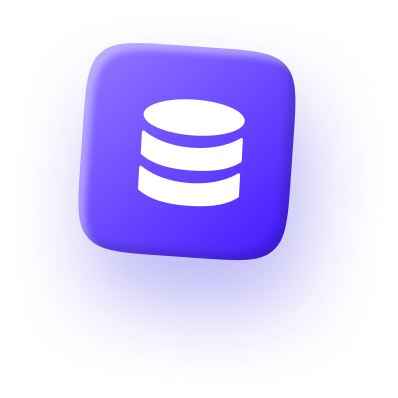


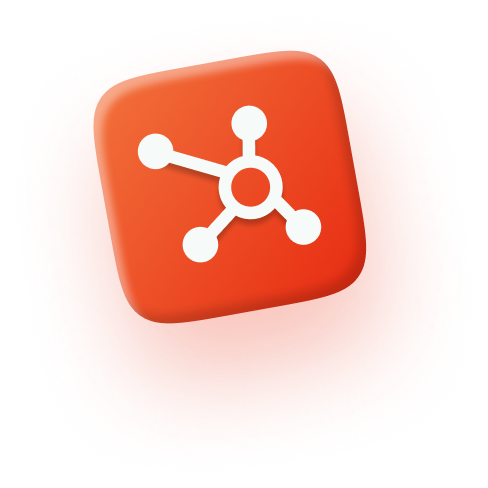
Let's start a project today
Start your project with us and unlock innovative solutions tailored to your needs. Our team is ready to bring your ideas to life and deliver exceptional results.
Request Solution






